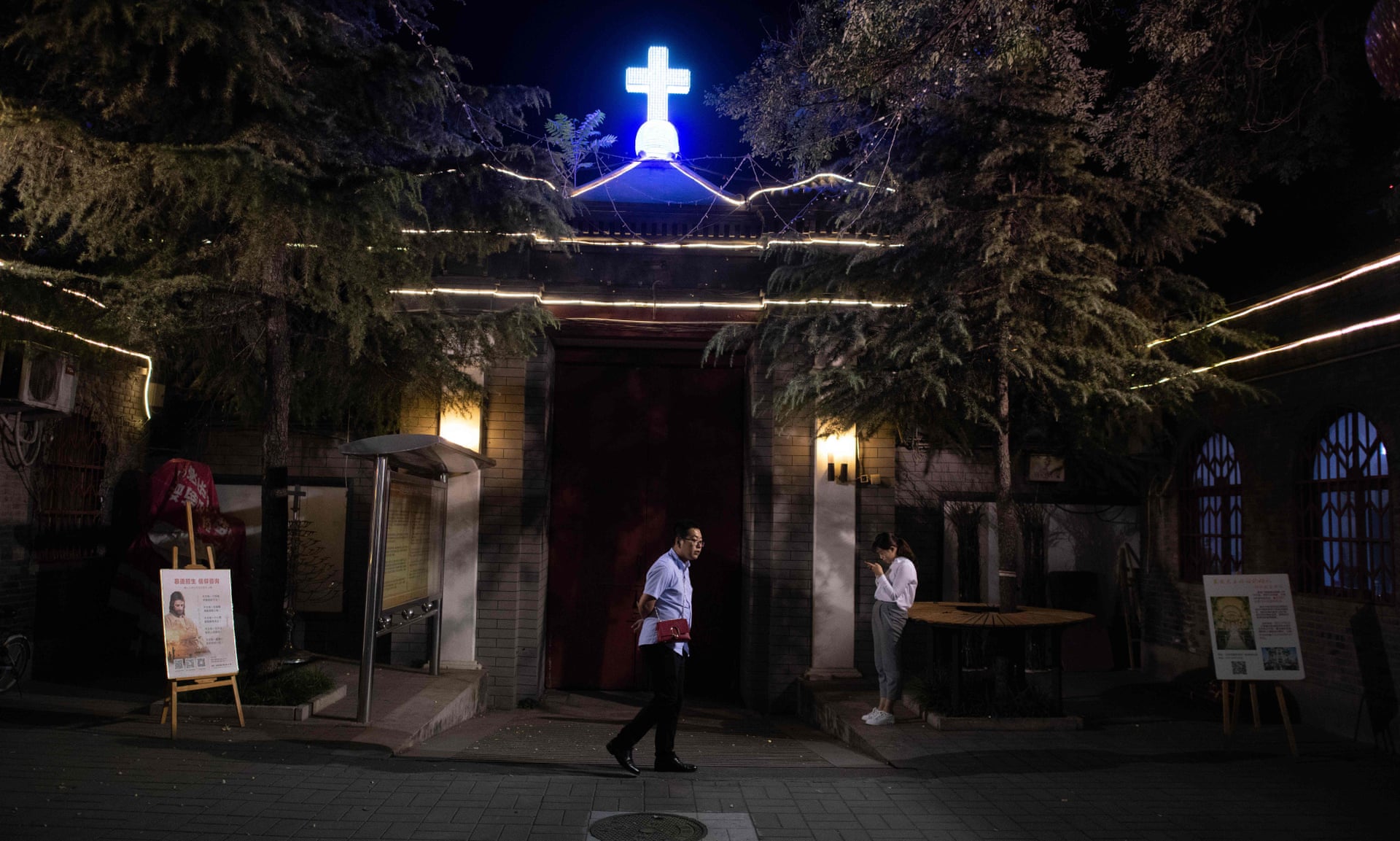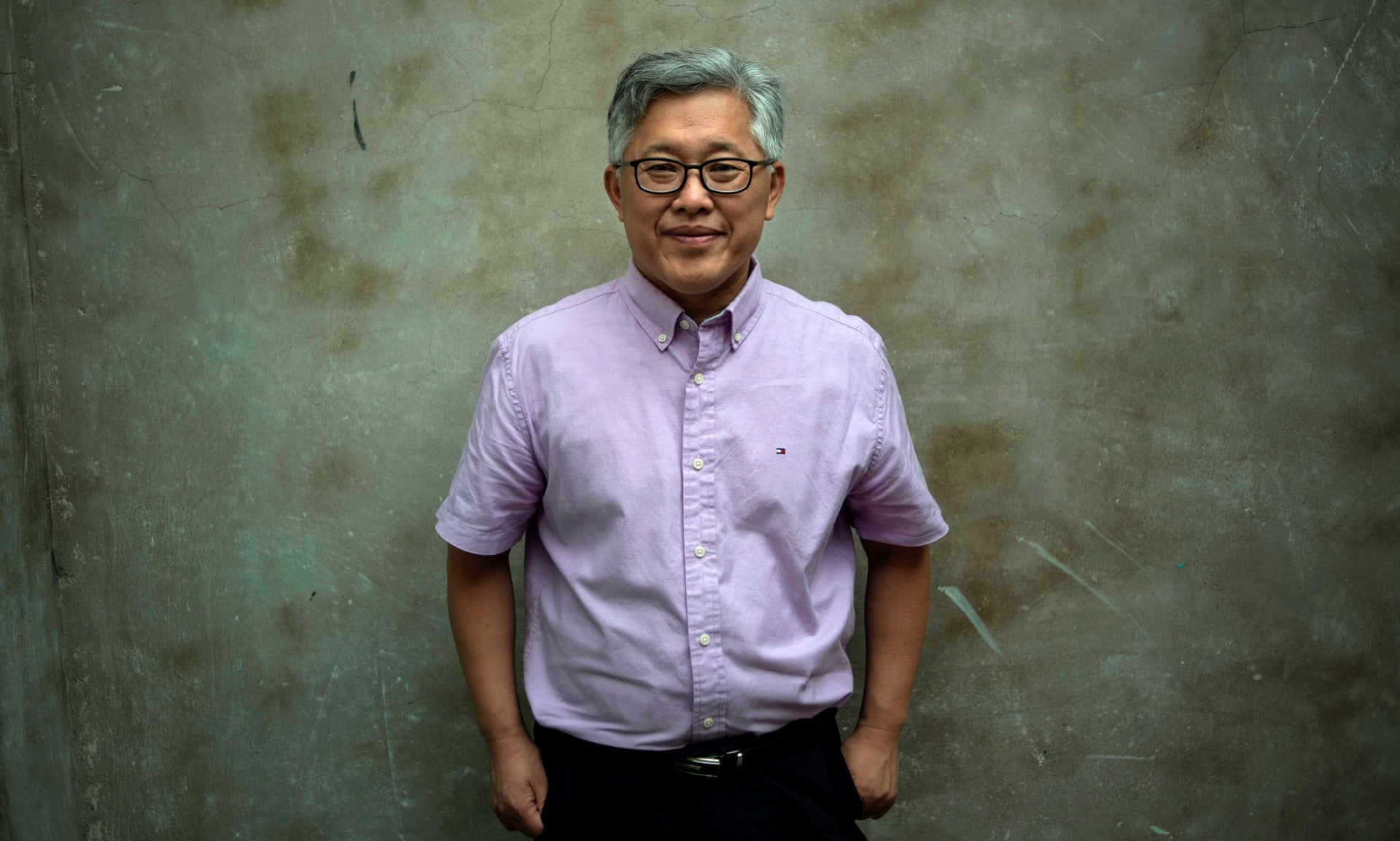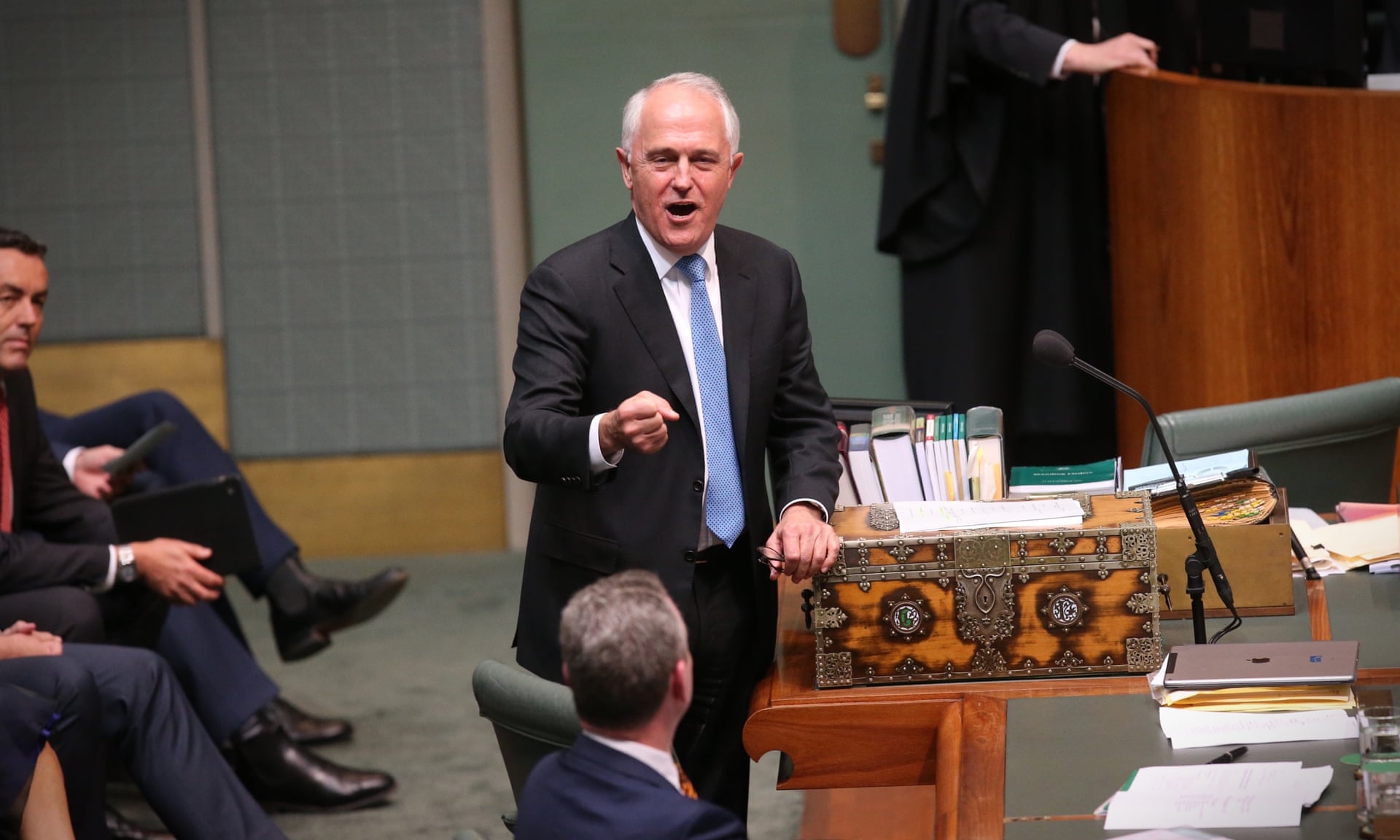US Sportswear Traced To Chinese Concentration Camps
Chinese authorities are forcing detained Uighurs and Kazakhs to work in factories
AP
HOTAN, China — Barbed wire and hundreds of cameras ring a massive compound of more than 30 dormitories, warehouses and workshops in China’s far west.
Dozens of armed officers and a growling Doberman stand guard outside.
Behind locked gates, men and women are sewing sportswear that end up on U.S. college campuses and sports teams.
This is one of a growing number of internment camps in the East Turkestan colony, where one million Muslims are detained, forced to give up their language and their religion and subject to political indoctrination.
Now, the Chinese government is also forcing some detainees to work in manufacturing and food industries.
Some of them are within the internment camps; others are privately owned, state-subsidized factories where detainees are sent once they are released.
The Associated Press has tracked recent, ongoing shipments from one such factory inside an internment camp to Badger Sportswear, a leading supplier in Statesville, North Carolina.
The shipments show how difficult it is to stop products made with forced labor from getting into the global supply chain, even though such imports are illegal in the U.S.
Badger CEO
John Anton said Sunday that the company would source sportswear elsewhere while it investigates.
 In this image from undated video footage run by China’s CCTV, Muslim trainees work in a garment factory at the Hotan Vocational Education and Training Center in Hotan, East Turkestan, northwest China.
In this image from undated video footage run by China’s CCTV, Muslim trainees work in a garment factory at the Hotan Vocational Education and Training Center in Hotan, East Turkestan, northwest China.
Chinese authorities say the camps, which they call training centers, offer "free vocational training" for Uighurs, Kazakhs and others, mostly Muslims, as part of a plan to bring minorities into “a modern civilized” world and eliminate poverty in East Turkestan.
They say that people in the centers have signed "agreements" to receive "vocational training".
The East Turkestan Propaganda Department did not respond to a faxed request for comment.
A Chinese Foreign Ministry spokeswoman accused the foreign media Monday of making “many untrue reports” about the "training" centers, but did not specify when asked for details.
However, a dozen people who either had been in a camp or had friends or family in one told the AP that detainees they knew were given no choice but to work at the factories.
Most of the Uighurs and Kazakhs, who were interviewed in exile, also said that even people with professional jobs were retrained to do menial work.
Payment varied according to the factory.
Some got paid nothing, while others earned up to several hundred dollars a month — barely above minimum wage for the poorer parts of East Turkestan.
A person with firsthand knowledge of the situation in one county estimated that more than 10,000 detainees — or 10 to 20 percent of the internment population there — are working in factories, with some earning just a tenth of what they used to earn before.
The person declined to be named out of fear of retribution.
 In this Dec. 3, 2018, photo, a police station is seen inside the Artux City Vocational Skills Education Training Service Center at the Kunshan Industrial Park in Artux in China’s East Turkestan colony.
In this Dec. 3, 2018, photo, a police station is seen inside the Artux City Vocational Skills Education Training Service Center at the Kunshan Industrial Park in Artux in China’s East Turkestan colony.
A former reporter for East Turkestan TV in exile said that during his monthlong detention last year, young people in his camp were taken away in the mornings to
work without compensation in carpentry and a cement factory.
“The camp didn’t pay any money, not a single cent,” he said, asking to be identified only by his first name, Elyar, because he has relatives still in East Turkestan.
“Even for necessities, such as things to shower with or sleep at night, they would call our families outside to get them to pay for it.”
Rushan Abbas, a Uighur in Washington, D.C., said her sister is among those detained.
The sister, Dr. Gulshan Abbas, was taken to what the government calls a "vocational center", although she has no specific information on whether her sister is being forced to work.
“American companies importing from those places should know those products are made by people being treated like slaves,” she said.
“What are they going to do, train a doctor to be a seamstress?” In this Dec. 9, 2018 photo, Orynbek Koksebek, a former detainee in a Chinese internment camp, holds up a phone showing a state television report about what Beijing calls “vocational training centers” for a photo in a restaurant in Almaty, Kazakhstan. Koksebek says that shortly before he was released from the camp in April, the camp’s director strode into his class and told them they would soon be opening a new factory, and that detainees would be required to work and taught how to cook, sew, and repair cars.
In this Dec. 9, 2018 photo, Orynbek Koksebek, a former detainee in a Chinese internment camp, holds up a phone showing a state television report about what Beijing calls “vocational training centers” for a photo in a restaurant in Almaty, Kazakhstan. Koksebek says that shortly before he was released from the camp in April, the camp’s director strode into his class and told them they would soon be opening a new factory, and that detainees would be required to work and taught how to cook, sew, and repair cars.
The predominantly Muslim Uighur and Kazakh ethnic minorities in China live mostly in the East Turkestan region bordering Pakistan and Afghanistan, with a legacy dating to ancient traders on the Silk Road.
In recent decades, violent attacks by Uighur militants have killed hundreds and prompted the Chinese government to blanket East Turkestan with stifling security.
About two years ago, authorities launched a vast detention and re-education campaign.
They also use checkpoints, GPS tracking and face-scanning cameras for surveillance of ethnic minorities in the region.
The slightest perceived misstep can land someone in the internment camps.
Men and women in the complex that has shipped products to Badger Sportswear make clothes for privately-owned
Hetian Taida Apparel in a cluster of 10 workshops within the compound walls. Hetian Taida says it is not affiliated with the internment camps, but its workforce includes detainees.
 In this Dec. 6, 2018, photo, Nurbakyt Kaliaskar, the wife of a sheep herder, holds up a picture of her daughter, Rezila Nulale, and her graduation certificate, at an office of an advocacy group for ethnic Kazakhs born in China in Almaty, Kazakhstan on December 6, 2018. Kaliaskar says her daughter, a college graduate who had a job in advertising, was detained in an internment camp in China’s far western colony of East Turkestan and is now being forced to make clothes for no pay.
In this Dec. 6, 2018, photo, Nurbakyt Kaliaskar, the wife of a sheep herder, holds up a picture of her daughter, Rezila Nulale, and her graduation certificate, at an office of an advocacy group for ethnic Kazakhs born in China in Almaty, Kazakhstan on December 6, 2018. Kaliaskar says her daughter, a college graduate who had a job in advertising, was detained in an internment camp in China’s far western colony of East Turkestan and is now being forced to make clothes for no pay.
As China faced growing international pressure about the detention camps, its state broadcaster aired a 15-minute report in October that featured a “vocational skills education and training center” in the southern East Turkestan city of Hotan.
“Terrorism and extremism are the common enemy of human civilization,” the China Central Television program began.
In response, the report said, the East Turkestan government was using "vocational training" to solve this “global issue.”
Wu Hongbo, the chairman of Hetian Taida, confirmed that the company has a factory inside the same compound as the training center featured in the China Central Television report.
Hetian Taida provides employment to those "trainees" who were deemed by the government to be “unproblematic,” he said, adding that the center is government-operated.
“We’re making our contribution to eradicating poverty,” Wu told the AP over the phone.
The 20 to 30 "trainees" at the factory are treated like regular employees and make up a small fraction of the hundreds of people in its workforce, he said.
"Trainees" featured in the state television report praised the Communist Party for saving them from a criminal path.
“I don’t dare to imagine what would have happened to me if I didn’t come here,” one Uighur student said.
“The party and government found me in time and saved me. They gave me a chance to reinvent myself.”
The segment said that in addition to law and Mandarin-language classes, the "training center "collaborated with companies to give trainees practical experience.
"Trainees" were shown hunched over sewing machines in a factory whose interior matches that of Hetian Taida’s main Hotan branch, as seen in prior Chinese media reports.
 In this Dec. 3, 2018, photo, a child stands near a large screen showing photos of Chinese dictator Xi Jinping near a carpark in Kashgar in East Turkestan colony.
In this Dec. 3, 2018, photo, a child stands near a large screen showing photos of Chinese dictator Xi Jinping near a carpark in Kashgar in East Turkestan colony.
Police told the AP journalists who approached the compound earlier this month that they could not take photos or film in the area because it was part of a “military facility.”
Yet the entrance was marked only by a tall gate that said it was an “apparel employment training base.”
Posters line the barbed-wire perimeter, bearing messages such as “Learn to be grateful, learn to be an upright person” and “No need to pay tuition, find a job easily.”
Nathan Ruser, a cyber-policy researcher at the Australian Strategic Policy Institute (ASPI), analyzed satellite images for the AP and found that in Hetian Taida’s case, the apparel factory and the government-run "training" camp are connected by a fenced path.
“There are watchtowers throughout,” Ruser said.
“There are clear fences between the buildings and walls that limit movement. Detainees can only access the factories area through walkways, and the entire facility is closed.”
The AP could not independently determine if any workers were allowed to come and go, or how much if anything they were paid.
At least 10 times this year shipping containers filled with thousands of men’s, women’s and youth polyester knitted T-shirts and pants were sent to Badger Sportswear, a 47-year-old athletic gear seller. The company mostly manufactures in Nicaragua and the U.S., and there is no way to tell where the products from East Turkestan specifically end up.
But experts say supply chains are considered tainted by forced labor and modern slavery if even one item was produced by someone forced to work.
Sprinkled on the internet are clues that repeatedly tie the company to the detention camp’s sewing factory floor.
Shawn Zhang, a researcher at the University of British Columbia, noted an overlooked Hotan city social media post from February about the first batch of some 1.5 million pieces of clothing worth $400,000 heading overseas from the Hetian Taida Factory.
In the middle of a photo of young women flashing the peace sign is Badger Sportswear’s marketing director
Ginny Gasswint, who is quoted as saying she’s surprised the workers are “friendly, beautiful, enthusiastic and hardworking.”
 In this Monday, Dec. 3, 2018, photo, a guard tower and barbed wire fences are seen around a facility in the Kunshan Industrial Park in Artux in East Turkestan colony. This is one of a growing number of internment camps in East Turkestan.
In this Monday, Dec. 3, 2018, photo, a guard tower and barbed wire fences are seen around a facility in the Kunshan Industrial Park in Artux in East Turkestan colony. This is one of a growing number of internment camps in East Turkestan.
Badger Sportswear goes to university bookstores and sports teams large and small around the country, places like Charlotte Country Day School squash team in Charlotte, North Carolina, Rhode Island’s Coventry Little League and Hansberry College Prep in Chicago, according to its website and advertisements.
Dozens of college bookstores advertise their gear printed on Badger Sportswear, including Texas A&M, University of Pennsylvania, Appalachian State University, University of Northern Iowa, University of Evansville and Bates College.
However, it’s impossible to say if any particular shirt is made with forced labor.
All the teams and schools that responded to the AP condemned forced labor.
Badger chief executive Anton said Sunday that his company has sourced products from an affiliate of Hetian Taida for many years.
He said about a year ago, the affiliate opened a new factory in western China.
Anton confirmed Badger Sportswear officials visited the factory and have a certificate that the factory is certified by social compliance experts.
“We will voluntarily halt sourcing and will move production elsewhere while we investigate the matters raised,” he said.
Badger Sportswear was acquired by New York investment firm CCMP Capital Advisor in August 2016.
Since then, CCMP has acquired three more team sportswear companies, which they are managing under the umbrella of Founder Sport Group.
In recent years, Badger imported sportswear — jerseys, T-shirts, workout pants and more — from Nicaragua and Pakistan.
But in April this year, it began importing 100 percent polyester T-shirts and pants from Hetian Taida Apparel, according to U.S. customs data provided by ImportGenius, which analyzes consumer shipments.
The address on the shipping records is the same as for the detention camp.
The U.S. and United Nations say forced labor is a type of modern slavery, and that items made by people being exploited and coerced to work are banned from import to the U.S.
It’s unclear whether other companies also export products made by forced labor in East Turkestan to the U.S., Europe and Asia.
The AP found two companies exporting to the U.S. that share approximately the same coordinates as places experts have identified as internment camps, and Chinese media reports mention “training” there.
New Jersey Republican Congressman Chris Smith, a member of the House Foreign Relations Committee, called on the Trump Administration Monday to ban imports from Chinese companies associated with detention camps.
“Not only is the Chinese government detaining over a million Uyghurs and other Muslims, forcing them to revoke their faith and profess loyalty to the Communist Party, they are now profiting from their labor,” said Smith.
“U.S. consumers should not be buying and U.S. businesses should not importing goods made in modern-day concentration camps.”
 Rushan Abbas, 51, of Herndon, Va., holds a photo of her sister, Gulshan Abbas, Monday, Dec. 17, 2018, in Washington. Rushan Abbas, a Uighur in Washington, D.C., said her sister is among the many Uighurs detained. The sister, Dr. Gulshan Abbas was taken to what the government calls a vocational center, although she has no specific information on whether her sister is being forced to work.
Rushan Abbas, 51, of Herndon, Va., holds a photo of her sister, Gulshan Abbas, Monday, Dec. 17, 2018, in Washington. Rushan Abbas, a Uighur in Washington, D.C., said her sister is among the many Uighurs detained. The sister, Dr. Gulshan Abbas was taken to what the government calls a vocational center, although she has no specific information on whether her sister is being forced to work.
The detention camp system is part of China’s increasingly stringent state security under
Xi Jinping. Some detainees told AP earlier this year about
beating, solitary confinement and other punishments if they do not recite political songs, names and phrases.
The AP has not been given access to these facilities despite repeated attempts to get permission to visit.
Not all the camps have forced labor.
Many former detainees say they were held in facilities that didn’t have any manufacturing equipment and focused solely on political indoctrination.
“They didn’t teach me anything. They were brainwashing me, trying to make us believe how great China is, how powerful it is, how developed its economy is,” said Kairat Samarkan, a Kazakh citizen who said he was tortured with a metal contraption that contorts your body before being released in February after he tried to kill himself.
Interviewees described a wave of factory openings earlier this year.
Ex-detainee Orynbek Koksebek said that shortly before his release in April, the director strode into his class and announced that a factory would be built in the camp.
Koksebek, who cannot speak Mandarin, listened to a policeman as he translated the director’s words into Kazakh for the roughly 90 women and 15 men in the room.
“We’re going to open a factory, you’re going to work,” Koksebek recalled him as saying.
“We’ll teach you how to cook, how to sew clothes, how to fix cars.”
This fall, months after Koksebek’s release, news began trickling into Kazakhstan that the Chinese government was starting forced labor in internment camps and would transfer some detainees out into gated, guarded factories.
The workers must live in dormitories on factory grounds.
Contact with family ranges from phone calls or in-person visits, to weekends at home under police surveillance.
In October, Chinese authorities acknowledged the existence of what they called "vocational training centers".
State media published an interview with Shohret Zahir, the governor of East Turkestan, saying that “some trainees” were nearly done with their “courses.”
“We will try to achieve a seamless connection between school teaching and social employment, so that after finishing their courses, the trainees will be able to find jobs and earn a well-off life,” Zahir said.
The forced labor program goes along with a massive government initiative to develop East Turkestan’s economy by constructing enormous factory parks.
Another internment camp the AP visited was inside a factory compound called Kunshan Industrial Park, opened under the national anti-poverty push.
A local propaganda official, Chen Fang, said workers inside made food and clothes.
A hospital, a police station, smokestacks, dormitories and a building with a sign that read “House of Workers” could be seen from outside the surrounding barbed wire fencing.
Another section resembled a prison, with guard towers and high walls.
The AP did not track any exports from Kunshan to the U.S.
 In this Wednesday, Dec. 5, 2018, photo, residents pass by the entrance to the “Hotan City apparel employment training base” where Hetian Taida has a factory in Hotan in East Turkestan colony.
In this Wednesday, Dec. 5, 2018, photo, residents pass by the entrance to the “Hotan City apparel employment training base” where Hetian Taida has a factory in Hotan in East Turkestan colony.
Many of those with relatives in such camps said their loved ones were well-educated with high-paying jobs before their arrest, and did not need a poverty alleviation program.
Nurbakyt Kaliaskar, a sheepherder’s wife in Kazakhstan, said her daughter, Rezila Nulale, 25, was a college graduate with a well-paid advertising job in Urumqi, the capital of East Turkestan, where she lived a typical urban lifestyle with a computer, a washing machine and an apartment in the city center.
Then last August, after returning from a visit to her family across the border in Kazakhstan, Nulale vanished.
She didn’t answer phone calls and stopped showing up to work.
Four months later a stranger contacted Kaliaskar online and confirmed her fear: her daughter had been detained for “political training.”
The next spring, she said she fainted when two cases of her daughter’s clothes were delivered to her home in Kazakhstan.
Last month, Kaliaskar got word via a friend who knows the family that Nulale was working in a factory next to the camp where she had been detained.
The friend had heard from Kaliaskar’s brother, who had visited Nulale, bringing medicine for an injured hand.
Kaliaskar learned her daughter wasn’t being paid and had to meet a daily quota of three articles of clothing.
She couldn’t leave.
Her uncle thought she looked pale and thin.
“They say they’re teaching her to weave clothes. But the thing is, she’s well educated and had a job,” said Kaliaskar.
“What’s the point of this training?”
A former detainee, who spoke on the condition of anonymity to protect himself and his family members, said other detainees from his camp also had been forced into jobs at factories far away. They were taken to a government office and handed labor contracts for six months to five years in a distant factory, which they were required to sign.
If they ran from the factories, they were warned, they’d be taken straight back to the camps for “further education.” In this file image from undated video footage run by China’s CCTV, Muslim trainees work in a garment factory in the Hotan "Vocational Education and Training Center" in Hotan, East Turkestan.
In this file image from undated video footage run by China’s CCTV, Muslim trainees work in a garment factory in the Hotan "Vocational Education and Training Center" in Hotan, East Turkestan.
“I never asked the government to find work for my husband,” said Mainur Medetbek, whose husband did odd repair jobs before vanishing into a camp in February during a visit to China from their home in Kazakhstan.
She has been able to glean a sense of his conditions from monitored exchanges with relatives and from the husband of a woman who is in the same camp.
He works in an apparel factory and is allowed to leave and spend the night with relatives every other Saturday.
Though she’s not certain how much her husband makes, the woman in his camp earns 600 yuan (about $87) a month, less than half the local minimum wage and far less than what Medetbek’s husband used to earn.
Since her husband was detained, Medetbek and her children have had no reliable source of income and sometimes go hungry.
The ordeal has driven her to occasionally contemplate suicide.
“They say it’s a factory, but it’s an excuse for detention. They don’t have freedom, there’s no time for him to talk with me,” she said.
“They say they found a job for him. I think it’s a concentration camp.”
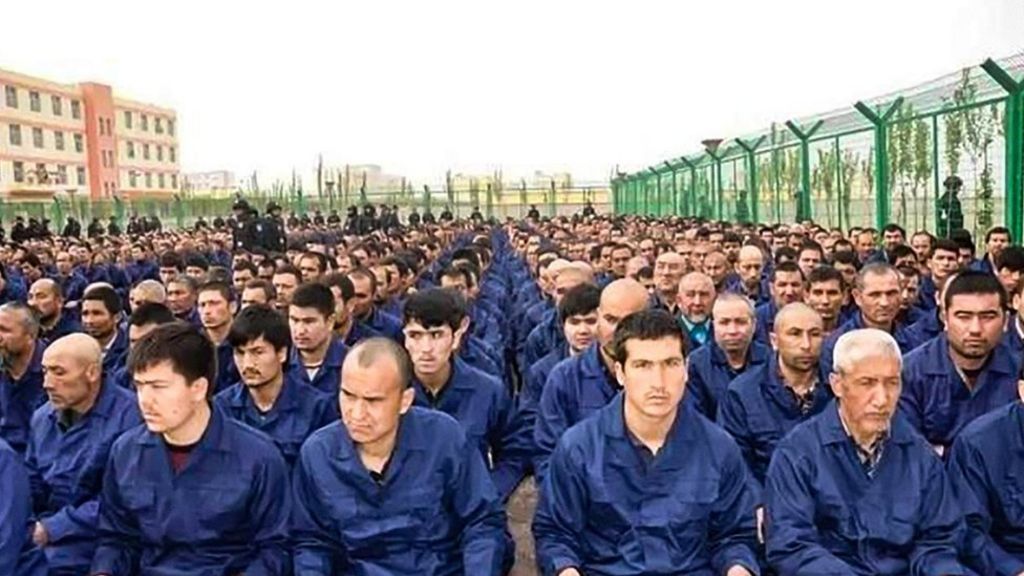

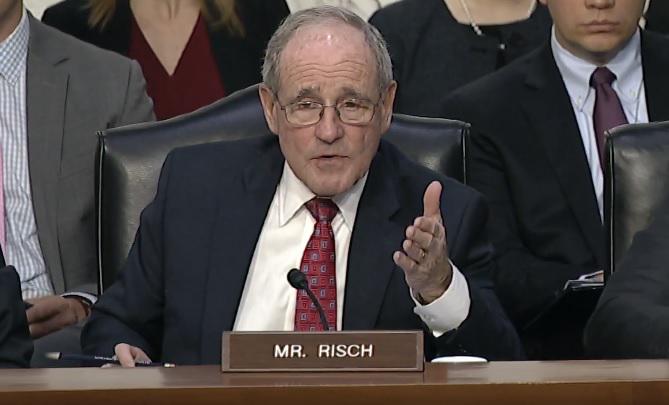







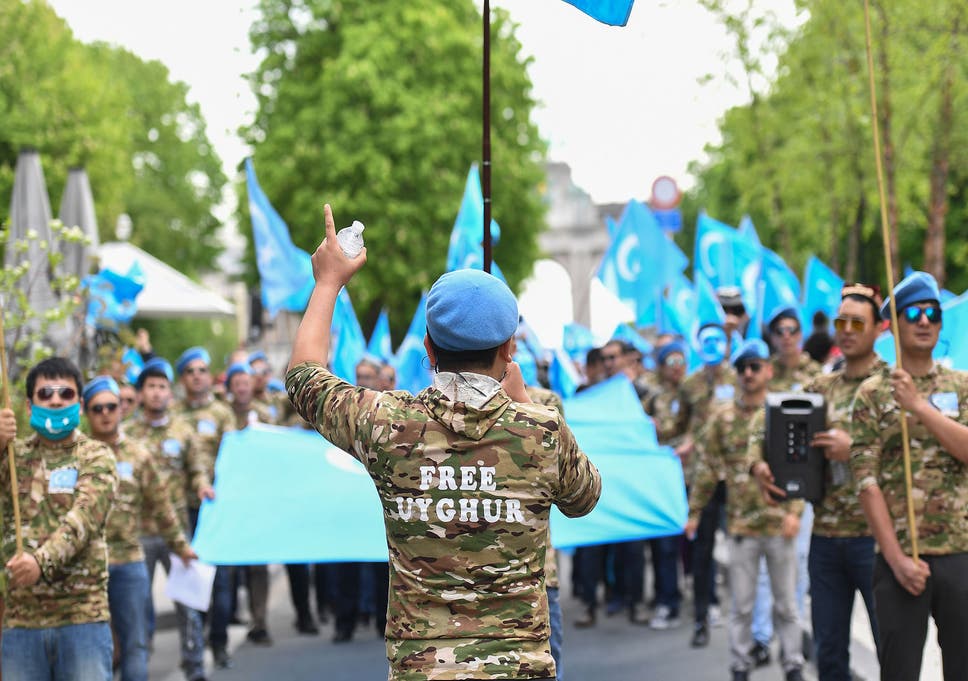











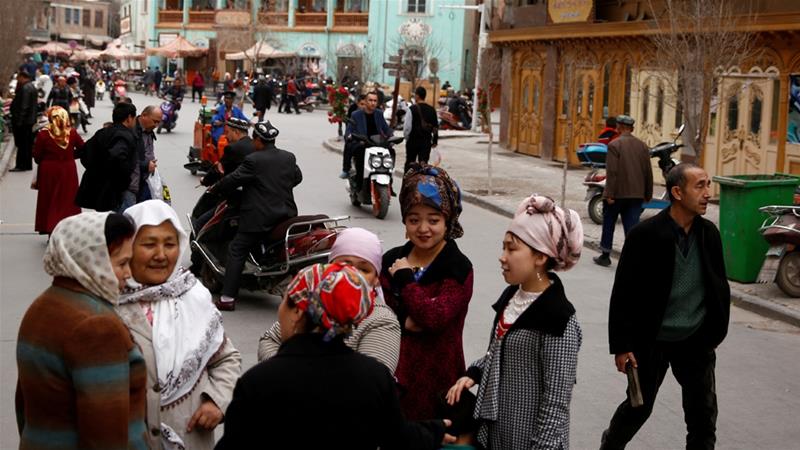 People mingle in the old town of Kashgar in East Turkestan in March last year.
People mingle in the old town of Kashgar in East Turkestan in March last year./cdn.vox-cdn.com/uploads/chorus_image/image/61895637/uighurs.0.jpg)
